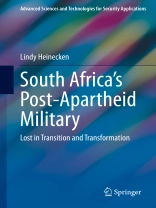This timely book examines how the South African National Defence Force has adapted to the country’s new security, political and social environment since 1994. In South Africa’s changed political state, how has civilian control of the military been implemented and what does this mean for ‘defence in a democracy’? This book presents an overview of the security environment, how the mission focus of the military has changed and the implications for force procurement, force preparation, force employment and force sustainability.
The author addresses other issues, such as:
· the effect of integrating former revolutionary soldiers into a professional armed force
· the effect of affirmative action on meritocracy, recruitment and retention
· military veterans, looking at the difficulties they face in reintegrating back into society and finding gainful employment
· gender equality and mainstreaming
· the rise of military unions and why a confrontational, instead of a more corporatist approach to labour relations has emerged
· HIV/AIDS and the consequences this holds for the military in terms of its operational effectiveness.
In closing, the author highlights key events that have caused the SANDF to become ‘lost in transition and transformation’, spelling out some lessons learned. The conclusions she draws are pertinent for the future of defence, security and civil-military relations of countries around the world.
Tabela de Conteúdo
Introduction: Overview of Lost in Transition and Transformation.- New Security Environment: Mission Focus, Organisational and Force Restructuring.- Peace Missions: The Nature and Experiences of Deployment and Reintegration.- Civil-Military Relations: The Theory, Practice and Implications of a Civil-Military Gap.- Political Transformation: Integration, Affirmative Action and the Management of Diversity.- Military Veterans: Difficulties of Reintegration and Challenges of Compensation.- Gender Equality: Inclusion, Exclusion and the Challenge of Re-Gendering the Military.- HIV/ AIDS: The Threat, Prevention and Controversy Surrounding Testing and Deployment.- Military Unions: Emergence, Resistance and Attempts at Obviating the Need for Unions.- Conclusions, lessons learned and future challenges.
Sobre o autor
Professor Lindy Heinecken has more than 25 years’ experience of teaching and research in the field. Her research interests include the challenges in recruiting suitable military personnel for a professional, technologically advanced military, and the role of women in post-conflict reconstruction and peacebuilding in Africa. This book draws on her past research, but includes recent interviews with key academics, politicians and military practitioners who are familiar with defence issues. She has edited volumes, contributed many book chapters, written a large number of journal articles and presented many papers at international academic conferences.












